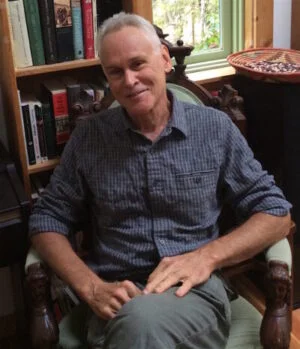Responding to disaster, sexual identity
Fifteen Thousand Pieces – A Medical Examiner’s journey through disaster
by Gina Leola Woolsey
Hamilton: Guernica Editions Inc., 2023
$25.00 / 9781771838115
Reviewed by Howard Macdonald Stewart
*

Gina Leola Woolsey has crafted a creative non-fiction read around a compelling character – a star Medical Examiner named John Butt – and what was apparently the most daunting moment in Butt’s career – the crash of a passenger jet near Halifax in late 1998 that killed all 229 passengers. Woven into this account is a backstory about the doctor’s evolving career as a brilliant pathologist, his not always successful private life, and his painfully slow coming out as a gay man.
The broad outlines of this book intrigued me enough to want to review it. In part, because I wanted to see how the writer would juxtapose an airline tragedy and an old white guy’s coming out story. The book kept me reading but, having read it carefully, I’m still not sure what to make of Woolsey’s formula. Why mix the many details of a grim airline catastrophe and its long aftermath, with a man’s challenging private journey over a lifetime? It seemed an odd juxtaposition before I read the book and it still does. It’s more clear to me how the Nova Scotia disaster seemed to mark a turning point in Butt’s evolution as a person (and as a pathologist?). But not in his grappling with his sexuality.
I had to ask myself, why did I want to read this book? Partly because I spent forty years as a human yoyo, bouncing back and forth between continents, again and again and again. Like most people, most of the time, I found the airports more stressful than the airplanes. But occasionally, I woke up in the noisy dark of a big jet during our designated sleeping hours and wondered: wtf am I doing here? Who are all these people? Why are we doing this? And how does this thing even fly? Some are perpetually white-knuckle fliers. But most of us take a lot for granted, put a great deal of faith in those giant cigar tubes with their improbably stubby wings. Occasionally though, one is confronted with inescapable misgivings, flights of paranoia about the contrived and artificial nature of zooming along at 900 kph, 10,000 metres above the ground, inside a thin metal sheath. That’s why they strive to distract you with all the cheesy movies.
So, one reason I read Fifteen Thousand Pieces was a sort of homage to past paranoia. Having eschewed air travel, I felt ready to read about what happens when things go really wrong up there. Woolsey confirms that, in fact, it’s pretty much what you’d expect. The machine malfunctions and starts to fly badly. Then, in a few seconds, that likely feel somewhat longer if you’re awake and conscious, it’s all over. Everything and everybody breaks into many pieces (whence the book’s title). Probably not a bad way to go, all things considered, as long as you don’t have a lot of warning. And Woolsey doesn’t dwell overlong on such details. Her focus is far more on the aftermath, because that’s where medical examiners like John Butt play a lead role. I didn’t really sign up to read about the arcane politics of post-disaster follow up, or the work of medical examiners more generally. But the author has done a tremendous amount of research about such work, about this particular case, and others, and she keeps us on board and entertained for the duration.

I was also interested by this book from afar because of its parallel or interwoven story of a driven medical professional coming out. Most of us know someone like Dr. Butt, some of whom came out early in life, some later, and some we’re still waiting for. It’s not something that’s very easy for a heterosexual male to get their mind around but it’s also not hard to imagine that it can be a tremendously difficult journey, especially for someone like our protagonist, born into a conservative family in a conservative province and working in a conservative profession. Again, Woolsey’s exhaustive research carries the day. She seems to have had almost unlimited access to many players in her doctor’s story, from childhood to old age, and this allows her to flesh out his life story, which she does both skillfully and credibly.
This isn’t a book I would have sought out, left to my own devices. But that says more about me than about the book. I had a few complaints, but again, these probably reflect more on me than on this book. In many places, the author offers us details that struck me as unnecessary to her story. I can imagine the temptation to include such detail when your files are full of them but can’t help feeling that a more judicious editor would have put many of them aside. We simply don’t need those long stretches describing the décor of the good doctor’s new home, or the locale where he meets his daughter, and so on. In other places some of this extraneous detail makes more compelling reading but can feel almost like disaster porn. Why do we need to know, for example, the gory minutia of other cases the doctor worked on as a consulting pathologist?
The author and her doctor seem to agree with Danielle Smith that “everything’s better in Alberta”, especially compared with the flawed approach to public pathology in a backwater like Nova Scotia. With less than a third of Alberta’s population in those days, and a tax base far smaller still, it’s perhaps not surprising that Dr. Butt didn’t find Nova Scotia’s system wasn’t up to snuff. But the repeated reminders and comparisons with Alberta are grating.
So, some good things, some not so good. But all in all, a good read for someone interested in issues of disaster response and how our public servants – doctors, cops, bureaucrats, clergy, and so on – respond, co-operate, and tangle with one another in the aftermath of deadly tragedies. I would guess it’s probably also a valuable account of an old white guy mellowing and gradually coming out over a lifetime. Still not sure about telling these stories together though.
*

Howard Macdonald Stewart is an historical geographer and semi-retired international consultant whose work has taken him to more than seventy countries since the 1970s. His memoir of a youthful bicycle trip down the Danube with war hero and debonair cyclist Cornelius Burke, Bumbling down the Danube,was published in The British Columbia Review in 2016, and his memoir, The Year of the Bicycle: 1973, followed in 2020. He is also the author of the award-winning Views of the Salish Sea: One Hundred and Fifty Years of Change around the Strait of Georgia (Harbour, 2017), as well as a popular Remembrance Day reflection, Why the red poppies matter. He has lived on Denman Island, off and on, for more than thirty years. He is now writing an insider’s view of his four decades on the road that followed his perambulations of 1973, notionally titled Around the World on Someone Else’s Dime: Confessions of an International Worker. Editor’s note: Howard Stewart has recently reviewed books by Dave Steen, Amanda Swinimer, Jim Kerr, John Boyko, Andrew Scott, and Catherine Nolin & Grahame Russell, for The British Columbia Review.
*
The British Columbia Review
Interim Editors, 2023-24: Trevor Marc Hughes (non-fiction), Brett Josef Grubisic (fiction)
Publisher: Richard Mackie
Formerly The Ormsby Review, The British Columbia Review is an on-line book review and journal service for BC writers and readers. The Advisory Board now consists of Jean Barman, Wade Davis, Robin Fisher, Barry Gough, Hugh Johnston, Kathy Mezei, Patricia Roy, Maria Tippett, and Graeme Wynn. Provincial Government Patron (since September 2018): Creative BC. Honorary Patron: Yosef Wosk. Scholarly Patron: SFU Graduate Liberal Studies. The British Columbia Review was founded in 2016 by Richard Mackie and Alan Twigg.
“Only connect.” – E.M. Forster
One comment on “Responding to disaster, sexual identity”